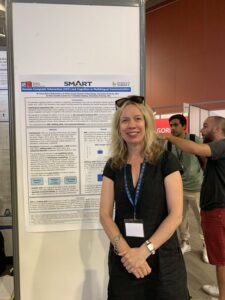It has been a busy summer for the SMART team, with the project being presented in different countries and to different audiences. Here are some highlights!
At the end of June 2022, some members of the academic and research SMART team travelled to Oslo, Norway for the 10th EST – European Society for Translation Studies’ Congress: Advancing Translation Studies. Research group presentations were given on a range of human-machine convergence topics.
Elena Davitti (Principal Investigator) and Annalisa Sandrelli (International Co-Investigator) presented a paper as part of the panel “Advancing Translation Studies through task comparative and hybrid task research into multilectal communication”. Their paper, Hybrid workflows for realtime interlingual communication via speech recognition: the SMART project, characterised interlingual respeaking (i.e. a speech recognition-based method that relies on human-machine interaction where the human listens to live input, and simultaneously translates that input into speech recognition software, which turns it into subtitles in the target language) as a form of ‘simultaneous interpreting 2.0‘ and as a hybrid practice. The presentation discussed the multifactorial and multimethod design used to explore the human variables (procedural, cognitive, interpersonal) involved in this complex practice. More to come in a forthcoming publication, watch this space!
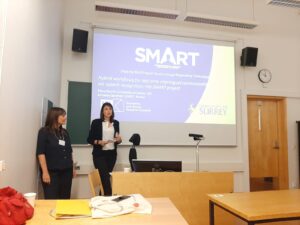
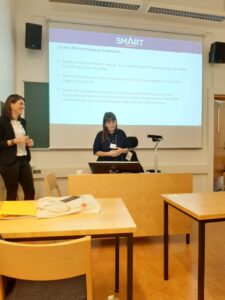
In the same period, Tomasz Korybski travelled to the 13th LREC – Language Resources and Evaluation Conference, where he presented the results from a parallel and interlinked project called MATRIC (Machine Translation and Respeaking in Interlingual Communication), carried out with Elena Davitti and other academic members of staff at the Centre for Translation Studies (Surrey). The paper titled “A semi-automated live interlingual communication workflow featuring intralingual respeaking: Evaluation and benchmarking” focused on an alternative technique for real-time interlingual live speech-to-text transfer. Findings contribute to enriching our research strand on hybrid modalities for live communication across languages. To find out more, read out paper here.
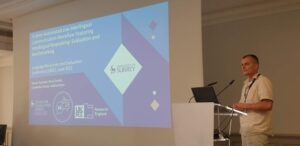
In July, Elena Davitti was also invited as keynote to deliver the talk “Shaping Multilingual Access through Respeaking Technology: A focus on accuracy” at the EM TTI Annual Event, Ionian University in Corfu. The talk presented in-depth results from quantitative and qualitative analysis in relation to the accuracy of live interlingual subtitles produced by language professionals after an upskilling course. It was the perfect occasion to share our results and reflect on the implications for other hybrid modalities for real-time speech-to-text transfer across languages via speech recognition.
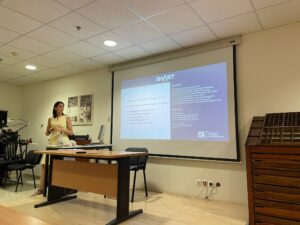
At the end of August, Anna-Stiina Wallinheimo travelled to Lille, France for the 22nd ESCoP – European Society for Cognitive Psychology Conference to present the most recent SMART cognitive findings in a poster titled Human-computer interaction (HCI) and cognition in multilingual communication, which was prepared in collaboration with Simon Evans (UK CI) and Elena Davitti (PI). These findings relate to another key dimension of SMART, which investigates the effects of the upskilling course in interlingual respeaking delivered as part of the project on the executive functions (EF) of language professionals, including working memory (WM), multitasking, and sustained attention. Preliminary findings suggest that WM and multitasking improved between the beginning and the end of the training. This indicates that such upskilling course can support positive cognitive changes in the respeaker. These findings should be taken into consideration when new courses are designed and when investigating alternative workflows involving human interaction with speech recognition.
